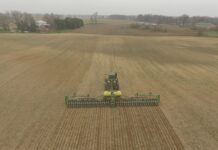SALEM, Ohio — As military veterans transition from service to civilian life, a growing number are discovering agriculture as a meaningful second career. One group seeking to help veterans with the journey from the battlefield to the farm is the Farmer Veteran Coalition, which gained an Ohio chapter in the last year.
Achievable dreams
According to the 2022 Census of Agriculture, Ohio has about 11,000 farmers with current or past military service.
Lou Driever, a veteran and president of Ohio’s 1,400-member strong chapter of the FVC, said the organization’s goal is to help them thrive.
“The Farmer Veteran Coalition helps veterans transition to becoming successful farmers, because it’s very easy to become an unsuccessful farmer,” Driever said.
Established as a nonprofit in 2023, the Ohio chapter aims to address the unique challenges veterans face as they get their start in farming. At the state level, Driever said the focus tends to be on mentorship, with the national organization offering training programs, resources, equipment grants and even tractor giveaways.
The Ohio chapter also offers workshop sessions, covering everything from forest farming to alley cropping and silvopasture that cater to diverse agricultural interests, with more in-person workshops planned next year. At least one of those sessions will be focused on how to write business plans and how to apply for basic grants.
“Every grant and every bank that loans to farmers wants to see your business plan. But more importantly, you need to have a business plan so you know if your dreams are actually achievable,” he said.
Driever said the organization emphasizes practical support and help for all veterans to discover what it takes to run a farm, whether on acreage or in an urban setting, and whether those veterans may have grown up working on a farm themselves or never stepped foot in that world before.
“People have to be willing to think outside the box,” he said. “They may be fixated on, ‘I’m going to do A, B and C,’ and they don’t understand that while that’s a wonderful path, it’s not profitable. Whereas if they did D, E and F, that would be a profitable path. And they’d be able to support themselves to the point where at some point in time in the future, they could do A, B and C on the side.”
The chapter is active on Facebook, where Driever posts about farm tours and practical demonstrations to offer hands-on learning opportunities, which he considers essential for veterans without prior farming experience.
But while the FVC’s outreach has been impactful, Driever acknowledges a persistent challenge: Everybody’s busy — some might not have time to check emails if they’re trying to run a business.
“The challenge is being able to ensure that we’re reaching the people, that we’re not getting lost in the 200 emails that everybody gets today,” he said.
Starting small
Mike Burgett, a colonel in the Ohio National Guard, found a new purpose in farming when he transitioned from a military career to full-time farming. Burgett credits the Farmer Veteran Coalition’s fellowship grant, which helped him acquire his first cattle, as foundational for establishing his farm.
“As far as our cattle business, you know, it would have been tough to start,” Burgett said. “That $3,000 would just have to come out of pocket right away. (In) the cattle industry, you’re not going to get the return at least 18 to 20 months anyways … So that was crucial for us.”
That grant allowed Burgett to build a foundation without breaking the bank.
Burgett’s 98-acre farm in Ashtabula County, Ohio, has become a local supplier of beef, eggs and hay. Burgett uses social media to market his products, sharing stories about his family farm’s history to connect with customers.
“I sell the story, not just the product,” Burgett said. “I think that really makes an impact on people, you know, especially in tight economic times like we’re currently in with rising prices of everything. I think that … connection with your customer, it may be the thing that sets you apart from somebody else.”
Burgett advises aspiring veteran farmers to have modest goals in the beginning, even if the reality seems daunting at first.
“Start out small. Build your client base, especially if you’re going to do direct sales,” he said. “To me, I think for a small farmer just starting out, it’s really (about) how you can grow and build your business … If you start out, you know, maybe with chickens or a head of cattle or sheep, you know, it’s something you can manage on a smaller acreage and do most or all the labor yourself, and then build from there.”
A path
For the Farmer Veteran Coalition, bridging the gap between veterans’ needs for financial support and their aspirations remains a priority to help them transition smoothly into agriculture, as the organization continues to provide training, resources and mentorship to veterans.
While progress has been made, Driever said there’s still work to be done in connecting veterans to meaningful agricultural careers and addressing the complex challenges they face.
“When you really need the help of the Farmer Veteran Coalition (is when) you’ve got marginal land, limited access to equipment, gaps in your knowledge base that you know exist but you don’t know what they are and limited labor,” he said. “Usually, it’s just you. So by … allowing us to provide mentorship, we can look at what you got (and) make suggestions … It’s not only directions to take, but where to get education to become a better steward of the land.”
Farming can be more than a livelihood — it can be a lifeline. With the right support and resources, agriculture can offer veterans a path to healing, purpose and community in their post-military lives.
For more information on the Ohio Farmer Veteran Coalition, visit online. For more information about the Farmer Veteran Coalition, visit farmvetco.org.












What is the main goal of the Farmer Veteran Coalition (FVC)?